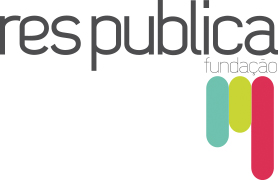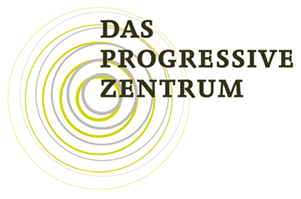Talking Green
Project
Talking Green is a research project that explores perceptions of climate actions across Europe. Through surveys in Hungary, Ireland and the UK, FEPS - in partnership with the Fabian Society, TASC, the Szociális Demokráciáért Intézet and the Progressive Hungary Foundation - is developing an understanding how the green transition is perceived especially by low- and middle-income people.
The collected data allow progressives to find the most effective ways to talk about climate change and develop participatory and effective policy proposals that address climate change while delivering a just transition that is aligned with people’s concerns.
The UK Survey
Policy Study | Talking Green: The UK Survey - Winning the Argument for Climate Action
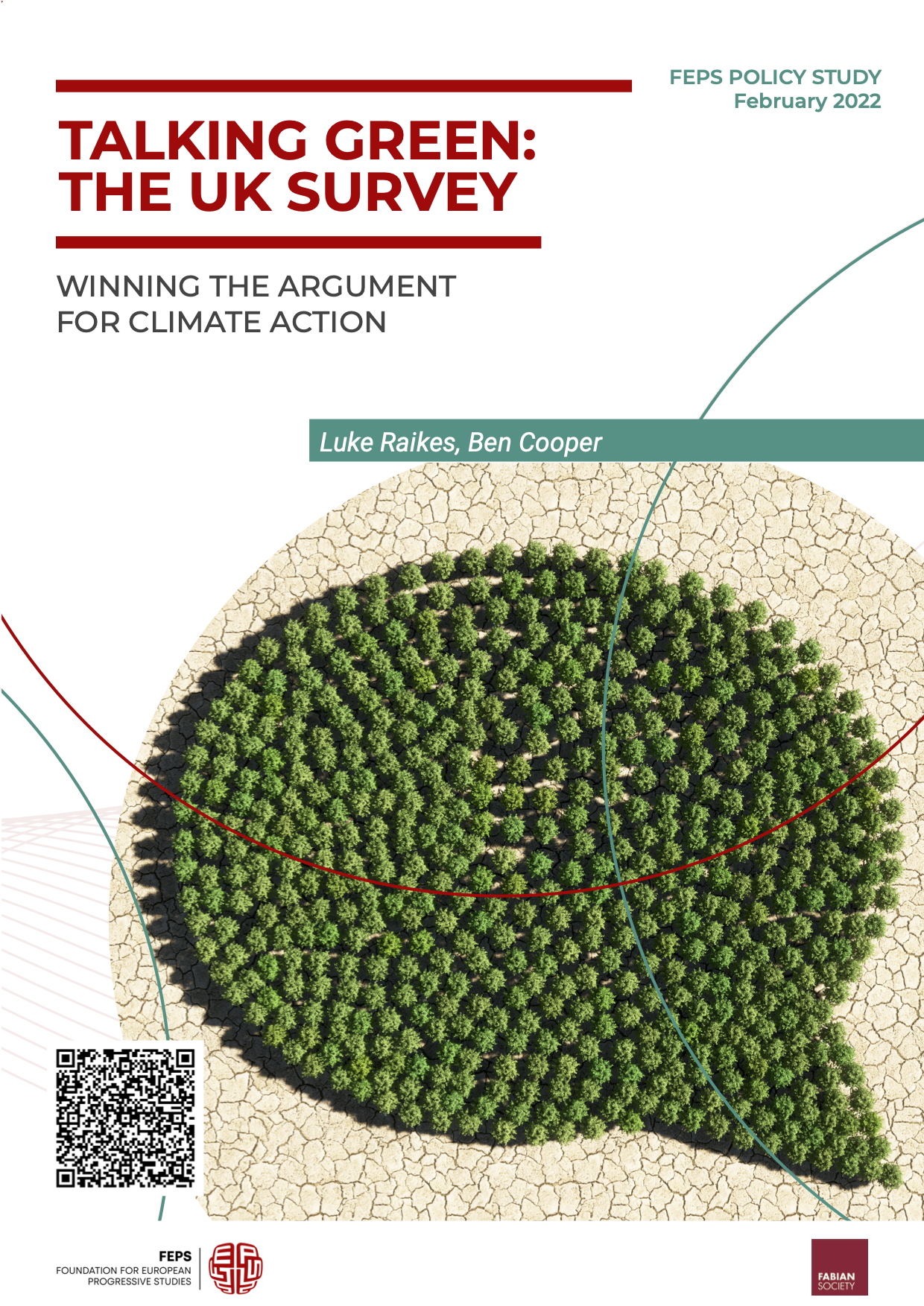 This Policy Study investigates respondents’ perceptions of how relevant climate change is compared to other policy issues. It also analyses opinions on particular policy measures and people’s reactions towards different frames and narratives.
This Policy Study investigates respondents’ perceptions of how relevant climate change is compared to other policy issues. It also analyses opinions on particular policy measures and people’s reactions towards different frames and narratives.
The study finds that although the public is concerned about climate change and want action, other policy areas such as the economy, health or Brexit are prioritised. Furthermore, environmental concerns vary with age, education, political alignment, and social class.
While there is a general optimism on the benefits of climate action for job creation, equally cleavages among social groups can be observed. Moreover, there is still considerable confusion over the impact of climate action on jobs and the terminology used (i.e. green jobs, net zero).
With regards to communication employed by progressives to reframe the debate on climate action, the study concludes that:
- Economic messages such as a focus on green jobs mostly preach to the converted and fail to persuade groups who need persuading most.
- Messages emphasising the quality of life and care for nature had broader appeal across the whole sample.
- Messages about specific jobs (e.g. in construction, plumbing) resonate more with people than abstract slogans.
In the media
- What climate campaigners are getting wrong – and how to fix it, by Luke Raikes | The Independent, 16.02.22
- ‘Green revolution’ rhetoric undermining support for climate action, report warns, by Harry Cockburn | The Independent, 16.02.22
Briefing | Public reactions to key climate change terms
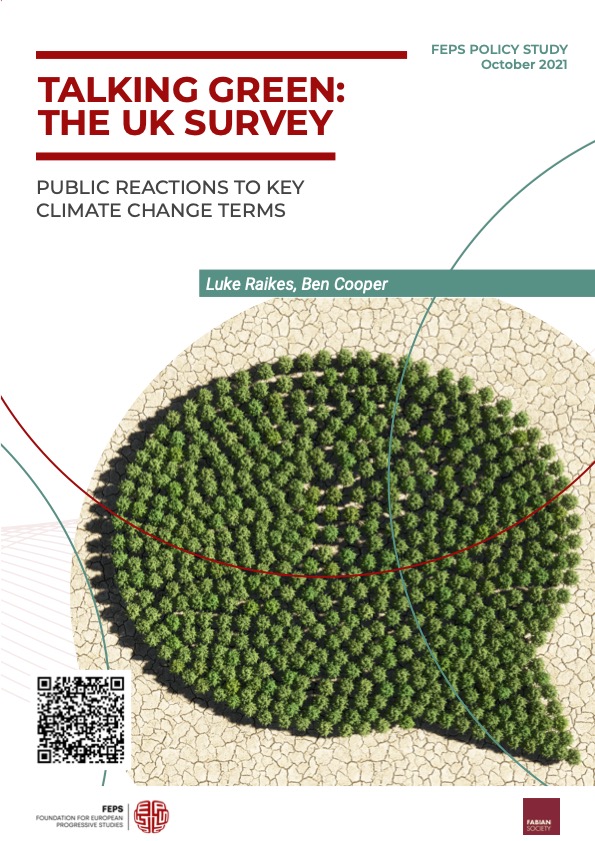 Politicians, the media and activists must improve the way they talk about climate change. There is general support for the government to take action on climate change and people do see the opportunity to create jobs – though this view isn’t overwhelming and opinions do vary between demographic and political groups.
Politicians, the media and activists must improve the way they talk about climate change. There is general support for the government to take action on climate change and people do see the opportunity to create jobs – though this view isn’t overwhelming and opinions do vary between demographic and political groups.
In this briefing, we conclude that politicians, the media and activists should start to:
- Refer to ‘net zero’ using clearer, more commonly understood words and, where there is no alternative but to use this term, elaborate on what it means.
- Talk about specific jobs and their quality, rather than leading on the fact that they are ‘green’ – as this seems to provoke scepticism and has far more of an association with the climate agenda than regeneration. This defeats the purpose of making the economic case.
- Resist the urge to ramp up the rhetoric by referring to the ‘green industrial revolution’, or large numbers of jobs, which provokes a significant negative and sceptical response from the public.
The Irish Survey
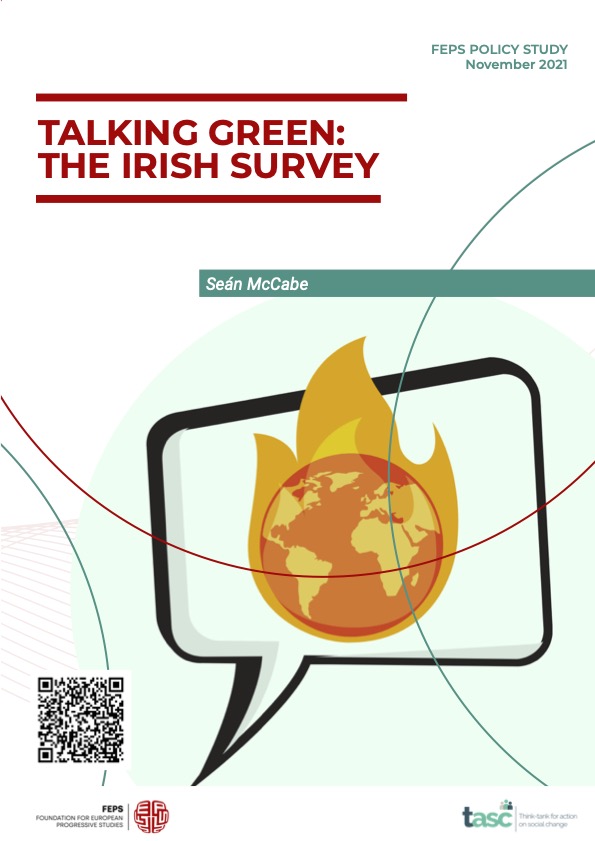
Talking Green: The Irish survey
This is the Irish instalment of the Talking Green research project exploring perceptions of climate action across Europe.
It is based on a survey of 1,010 respondents conducted in summer 2021. The research attempts to understand how climate action is viewed by the Irish public when compared to other pressing priorities, the hopes or fears that climate action evokes and the most effective messaging to communicate the crisis and the necessary response.
The survey also explored levels of trust, which will be essential for a stable transition to zero carbon societies. Finally, the questionnaire sought to understand the appetite among the public for bottom-up initiatives that would be community-led.
Key findings of the survey include:
-
Climate change is not considered a top priority by the public.
-
Climate change is not the main priority for young people.
-
There are class divisions in terms of prioritisation of climate change, but they are not very pronounced.
-
The farming community show the most substantial de-prioritisation of climate action
-
Politicians suffer from a lack of trust on issues of national importance.
-
A majority of respondents indicated that they were concerned that the policies implemented to tackle climate change would make their lives harder.
Talking green Hungary
Briefing | Public perception of a just green transition in Hungary
by Benedek Jávor
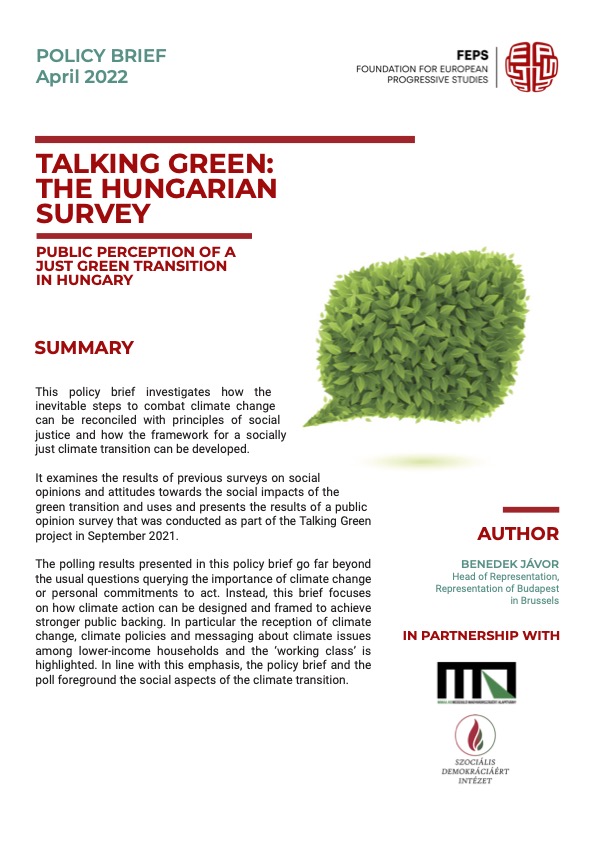
This policy brief summarises the results from the Talking Green survey in Hungary that was carried out in September 2021. The polling results presented in this policy brief go far beyond the usual questions querying the importance of climate change or personal commitments to act.
Instead, this brief focuses on how climate action can be designed and framed to achieve stronger public backing. In particular the reception of climate change, climate policies and messaging about climate issues among lower-income households and the ‘working class’ is highlighted. In line with this emphasis, the policy brief and the poll foreground the social aspects of the climate transition. Read the Policy Brief

























